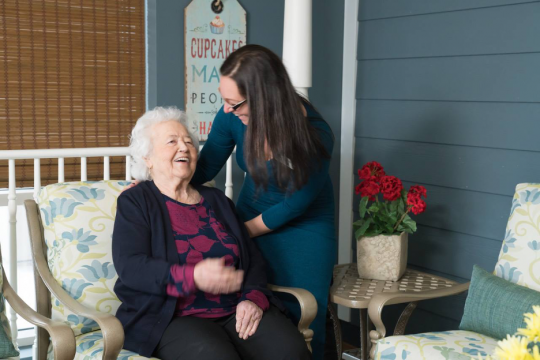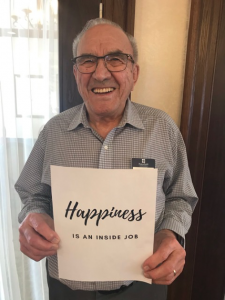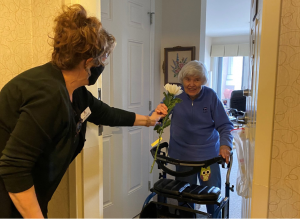
“Be kind to others, you never know what they’ve been through”, says Carol.
“If you can, help those in need”, chimes in Emily, “That’s the best advice.”
We couldn’t agree more with these residents at the Summerwood Retirement Residence in Alberta. While many of us have heard the Golden Rule “Treat others as you would like others to treat you”, it turns out that there are real life benefits to treating others with kindness.
Celebrating World Kindness Day
Launched in 1998 by The World Kindness Movement, World Kindness Day is celebrated yearly on November 13th . With 27 countries officially participating, their mission is to inspire individuals and connect nations to create a kinder world.
Any intentional act of kindness helps us relate to other people and have more positive relationships with friends, family, and even perfect strangers that we encounter in our daily lives. Besides simply improving personal relationships, however, several studies show that do-gooders enjoy better physical, mental and emotional health—particularly if older.
As a bonus, it’s also an excellent coping skill for the Covid-19 era.
Benefits of Kindness
1. Kindness Can Keep You Young
Yes, you read that right! You may be shaking your head, but we’re not just saying this—there’s science to back it up.
According to Dr. David R. Hamilton, “There’s a very powerful natural antioxidant in the body that gets produced when we’re kind. It’s called ‘oxytocin’.”
In an article published by Hay House, he goes on to say “Whenever you do something kind, receive kindness, or even witness an act of kindness, you turn on an oxytocin tap in your body that delivers it to your arteries, your skin, your muscles, your brain, your immune system, essentially slowing ageing throughout the body at the cellular level.”
Known as the ‘love hormone’, oxytocin reduces blood pressure and it may also go one step further. Research has shown that people who regularly offered practical help to others had a lower risk of mortality.
Kindness can strengthen our immune system, reduce aches and pains, and boost energy and strength in elderly people. In a 2006 study, the most loving and kind couples were shown to have the lowest levels of atherosclerosis (clogging of the arteries)!
Living longer isn’t the only health benefit of being kind to others: people who perform intentionally helpful acts for others (e.g., sharing their umbrella with a stranger in the rain) versus being kind to themselves, (e.g., buying a gift for themselves) simply enjoy a more positive outlook on life.
2. Being Kind to Others Boosts Your Own Happiness
 Kindness is simply the act of being good, friendly, and compassionate toward other people. It also encompasses an element of being altruistic. Like exercise, altruism releases endorphins, a phenomenon known as a “helper’s high.”
Kindness is simply the act of being good, friendly, and compassionate toward other people. It also encompasses an element of being altruistic. Like exercise, altruism releases endorphins, a phenomenon known as a “helper’s high.”
Researchers at Oxford University found that engaging in random acts of kindness for loved ones and strangers brought significant joy to study participants. In fact, even memories of kind acts towards others could have a positive impact on mood.
So, go ahead, help someone in need, buy someone coffee or lunch—it may be just the pick-me-up you need.
3. Kindness Eases Anxiety
When we’re kind to others—or when others are kind to us—our bodies release serotonin. This chemical is produced by cells in the ‘pleasure center’ of our brain and contributes to feelings of well-being and happiness.
So, the next time you’re feeling a little anxious, look for opportunities to help others. Whether smiling at a stranger or volunteering your time, even a small gesture can make a big difference.
Improved self-esteem, a better outlook on life (optimism), and less anxiety are all great reasons to be kind, but it doesn’t stop there. Kindness has a positive effect on others that spreads.
Kindness is Contagious
 Have you ever noticed that when you smile at someone, they are likely to smile back?
Have you ever noticed that when you smile at someone, they are likely to smile back?
New research may have unlocked the mystery behind this behaviour: kindness is contagious. Seeing someone else help another person produces feelings of goodwill, subsequently causing people to reach out and do something altruistic themselves.
It’s easy to test this self-replicating phenomena for yourself: pay it forward!
Put Kindness on Repeat
As you’ve read, kindness is linked to a wealth of physical and emotional benefits. The trick though? In order to reap on-going gains, acts of kindness must be repeated. That’s why kindness is most beneficial as a practice—something to incorporate into our daily routine whether in the form of volunteer work, dropping coins into an expired parking meter, baking for your neighbour, or holding the elevator for someone.
How to Help A Senior in Your Community
 Normally, programs for elders aim to increase human contact — but with community senior centres and day programs closed indefinitely and residences turning away visitors, we’re left wondering how we can (safely) help our elderly friends, neighbours, and family, as coronavirus continues to spread.
Normally, programs for elders aim to increase human contact — but with community senior centres and day programs closed indefinitely and residences turning away visitors, we’re left wondering how we can (safely) help our elderly friends, neighbours, and family, as coronavirus continues to spread.
It’s a terrible irony of the virus: for older adults, steps to prevent the spread of COVID-19 increase the risks of social isolation, which carries its own devastating health effects similar to smoking and alcoholism.
For lonely seniors, an act of kindness can make a big impact.
Get started making a difference with these 5 simple ideas:
- Send an encouraging card or hand-written note.
- Make up a care package and drop it off.
- Offer to take a senior’s dog out for a nice, long walk.
- Teach them tech so they can connect.
- Send flowers or a potted plant.
- Compliment the first three people you talk to.
At All Seniors Care, we love acts of kindness! We believe in building better selves and better communities, one act of kindness at a time.
For more tips on living life to your fullest, read our blog or go to our Facebook page. From the Mindful Monday newsletter on The Science of Happiness to watching our Life is Good video series , we strive to bring day-to-day joy into the lives of residents and the community.
See how All Seniors Care can help you achieve a healthier, happier lifestyle. Click the link for more information on how our communities are setting the benchmark for senior living with exceptional services, amenities and care options.
Writer: Julianna McLeod